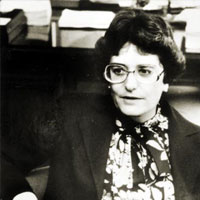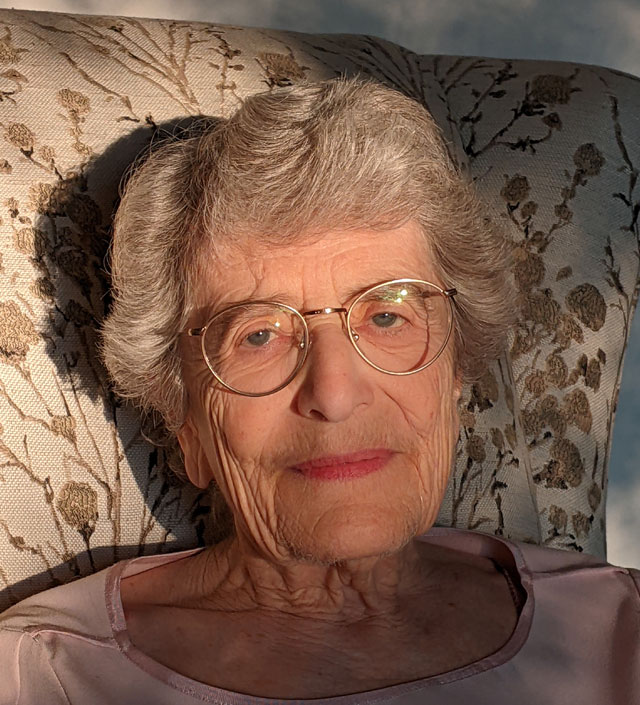Editor’s note: Rethinking65 recently spoke with securities attorney Roberta Karmel, the first woman commissioner of the Securities & Exchange Commission. She also spent many years in private practice and was a public director of the New York Stock Exchange. Karmel, 85, retired earlier this year from Brooklyn Law School where she taught for 36 years. She has served on many boards and is currently a director on the CFP Board of Standards.
Jerilyn Klein: You worked at a brokerage firm for a few months between college and law school and then joined the SEC as an enforcement attorney after graduating from NYU Law School in 1962 because you’ve said the Commission was one of the few places then hiring women attorneys. Did your brokerage-firm experience influence your interest to pursue securities law and what aspect did you find appealing?
Roberta Karmel: I had been interested in the securities business partly because one of my father’s interests was the stock market, although he was a lawyer. I enjoyed working in the brokerage firm — it made me more interested in the securities industry, although I was planning to go to law school, and it gave me a background at the SEC that I think a lot of the other attorneys did not have.
At the brokerage firm — it was a small over-the-counter trading house whose customers were other broker-dealers — I kept track of the traders’ long and short positions because they were supposed to be flat at the end of the day. I had this old-fashioned Friden calculator on my desk. Sometimes they would holler out to me, “Can I take on this position? Can I take on that position?” When I told the securities analyst I was assigned to work for that I was leaving to go to law school, he said, “Why do you want to do that? You could have a great career in the securities industry.”
Klein: You’ve reinvented yourself numerous times. What motivated you to make these professional changes and what does it require to take chances and be successful at new ventures or second — and even third, fourth — acts?
Karmel: It had to do partly with my personality, that I was always interested in learning something new. But it also had to do with the ups and downs of my career and the ups and downs on Wall Street. I left the SEC the first time because I was kind of bored with just doing fraud cases and all my friends had left. A lot of them went in-house and were the first compliance people at brokerage firms as the field of legal compliance was taking off. I always wanted to be with a big law firm, thinking, “That’s the real practice of law.” But when I graduated from law school, I just didn’t get that opportunity; the firms were not hiring women.
By the time I left the SEC, some firms had started hiring women as associates. I left the first firm I went to because I did not become a partner and I had the opportunity to go to Rogers & Wells as a partner. Then I had the great fortune of being able to go back to the SEC as a commissioner. Afterward, I went back to Rogers & Wells, and then into teaching. That’s the abbreviated version of my career.
I also went on some corporate boards, which I was kind of hesitant about because I thought, “I’m a lawyer, not a business person” — but I found that to be a very interesting and valuable part of my career. Being on the board of the New York Stock Exchange was exciting. You might say I had a lot of changes in my career, but in one sense, it was a pretty much the same career all the time: I was always thought of myself as a securities lawyer.
Klein: President Jimmy Carter appointed you as an SEC commissioner in 1977. What was it like throwing your hat into the ring and serving in this role?

Karmel: It was wonderful. To me, that was the dream job of any securities lawyer. I had some problems there because I was pushing back against what I saw as the excesses in the enforcement area. We were implementing the National Market System. Congress had passed the Securities Acts Amendments 1975 — I thought that was extremely challenging and interesting. Also, we did a reform of the Investment Company Act in the sense of trying to change a lot of the no-action letters into rules. And then there was a lot of focus on corporate governance because that was what the chairman was interested in.
It was a very difficult job. In fact, one of my kids who loved to draw cartoons drew a picture of this little lady with a huge briefcase walking home, and the side of the briefcase said, “SEC Homework.” Even my kids realized I was working very, very hard.
Klein: What were the biggest obstacles you faced as a women attorney in the securities industry? What advice do you have for women who want to be successful in financial services and find work-life balance?
Karmel: Work life balance is very difficult; I think every working mother has found it very difficult. I was very lucky that I had easy pregnancies and healthy kids. If that isn’t true, it’s even much more difficult. It was so unusual to be a working woman and a working lawyer at that time. I just persisted because of the work; I think I always loved the work.
You have to be very strong and very sure that the career you have is what you want to do. With Covid, a lot of women have dropped out of the workplace. I don’t think I could have possibly managed working from home with four kids running around. The father of my children, my husband, was a professor so he had more flexible hours than I had. Another problem today is people in law firms and securities firms are expected to be on call 24/7 with their phones. Because there don’t seem to be enough hours in a day, women tend to be more efficient in their jobs — but they also have less time for socializing, which is important for advancement.
Klein: Did you ever consider retiring in your mid-60s, when many people do? Why or why not?
Karmel: No, because I liked what I was doing. A lot of lawyers don’t want to retire. Some now have to do because their firms have a retirement age or they’re considered not productive enough in terms of bringing in business. I know a lot of lawyers who retired and were very unhappy being retired. Some of them joined other law firms or did other things. A lot of them think, “Oh, I’ll go into teaching.” They don’t realize that teaching is a whole other career and it’s not something you can just fall into because you retired from a law firm.
At some point, pre-Covid, I went halftime at the [Brooklyn Law] school and I thought that was perfect. I had really planned to continue with that, indefinitely. Then Covid came along and I had health issues and I thought, “Oh well, I have to retire.” But I’m not that happy retired.
Klein: What would you like financial advisors to understand about serving clients who continue to work beyond traditional retirement age?
Karmel: The way you manage their money it is not necessarily the way you would manage money for someone who is simply saving for retirement and is maybe in their 50s. The [older] person might be thinking not only, “Do I have enough money left for my living expenses?” but also “It’s likely I’m going to have health issues — do I have enough money for that? Do I have long-term insurance to cover my expenses?”
I have 10 grandchildren and so I think, “Do I have savings that can help them get through their education, if necessary?” Someone without children and grandchildren is going to have a very different profile. So, it’s a very individual analysis that an investment advisor has to make.
Klein: What kind of questions should advisors ask clients to get to better know them and their goals?

Karmel: Why are you working? Is it because you love your job, because you love what you’re doing? Or because you need the money, or because you don’t have anything else going on in your life? Is there something else you’d like to do? Do you have hobbies you’d like to follow?
I know some people who were in my field who decided, “I like what I’m doing and it’s interesting, but I’ve always wanted to paint” or “I’ve always wanted to spend more time as a musician.” People have different interests. Some want to move to another state, some want to stay in New York and go of the theater every night. I think a financial advisor has to be cognizant of the lifestyle a person wants to have when they’re older and how much money they need for that lifestyle.
Klein: Age discrimination remains an elephant in the room in many workplaces. Are you concerned this is impacting retirement outcomes?
Karmel: I was very fortunate to be a tenured professor; tenured professors cannot be fired. Maybe that is something that’s going to go by the boards because of the crisis in education, but I never had to worry about being pushed out because of age. That’s not true in a lot of other parts of the workplace. For example, I mentioned many law firms have a mandatory retirement age.
There’s such a labor shortage and it’s important to keep older people in the workplace because they have skills and judgment. At the same time. I think older people have to be cognizant that maybe someone who is in their 50s and is trying to send kids to college and is working very hard perhaps should be making more money than they are. So, it’s a balance. One reason I went half time at the school was I felt I wasn’t going to be as productive.
So, I think the older people that want to work have to understand the attitudes of the younger people in the organization, but I think the younger people have to value the contributions of older workers.
I have felt age discrimination in certain ways not so much in the workplace but in other situations. Sometimes you go into a store and you’re not waited on as quickly. Or you say something to someone and they’re not paying attention to what you’re saying. It’s very subtle, but there is definitely age discrimination.
Klein: Do you think there’s anything the government or private industry can do to help remedy age discrimination?
Karmel: Private industry has to value the contribution of its older employees and be flexible. I think this is going to happen anyway because after Covid people are demanding flexibility — the ability to not commute every day, the ability to work from home, the ability to have flexible hours. I think a lot of younger people, particularly women with children, are demanding that and I think it’s something that older people are probably going to be demanding, too, if they are going to stay in the workplace.
Given our demographics, it is important to keep older employees in the workplace. Look at a country like Japan; they have done everything they can to encourage older people to stay working.
Klein: While recently attending the Practicing Law Institute’s SEC Speaks conference, I observed that the SEC and PLI seem to value longtime, experienced practitioners. Former SEC Chair Harvey Pitt [now 77] participated. Joining you on the Division of Trading and Markets panel was SEC assistant director Michael Macchiaroli — and I heard you ask him how he found the fountain of youth so we could all go there!
Karmel: Michael was on the staff when I was a commissioner in the late 1970s so I remember him from that time. He must be one of the longest serving employees at the SEC.
I think the SEC has always valued its employees and has always had good policies in terms of hiring women, minorities and older people. I think what has mattered at the SEC is the extent to which employees can contribute to the work. Its hiring culture is very inclusive and I guess that’s something broker-dealer firms might want to think about.
PLI also has some very longtime members on the board and employees. As long as I can remember, SEC Speaks has had the same format, which includes past commissioners being on panels and commenting. Some former commissioners have just gotten older and older!
Klein: What is the SEC doing to help reduce fraud against older investors?
Karmel: It’s a very important issue. There’s fraud against older people much more generally than financial [securities] fraud. I probably get half a dozen calls every day of someone trying to perpetrate some kind of fraud. I’ve taken to just not answering the phone if it’s not a number I recognize. Older people are very vulnerable to high pressure sales practices. I think the SEC is aware of this and has focused on it in terms of its enforcement cases. I don’t have the details or the figures.
Klein: Are there any SEC cases that you’re keeping an eye on right now?
Karmel: There is a case going up to the Supreme Court from the Fifth Circuit, SEC v. Cochran. The Right has been trying to get rid of administrative law judges, if not administrative agencies altogether. The government generally couldn’t function without ALJs. They’re a very important part of the federal government’s apparatus. There’s only a few with the SEC, but the Social Security Administration has hundreds, thousands maybe. And other agencies have a great many ALJs, I think this could be an important case.
Klein: What accomplishments you are most proud of from your career?
Karmel: People often ask me that question and I usually give the same answer: I had four children, they all went through college and graduate school and graduated with no loans. I consider that my biggest accomplishment.
Professionally, becoming an SEC Commissioner, being the first woman commissioner of the SEC, I think that’s what people remember about me and consider important. I also probably educated thousands of students on securities laws because I was a professor for so long. I recently got a very nice email from one of my former students saying, “Professor Karmel, you might not remember me, but I took your securities law course, a number of years ago, and now finally, I have a job at the SEC and I’m going there.” This kind of contact after the fact is very heartwarming and I really appreciate it.
Klein: How are you spending your free time?
Karmel: I do a lot of reading. I mostly like biographies and books about the securities industry, but I read novels, too. And I spend a lot of time with my family. I have a subscription to the opera and I love to go to the ballet. I also like to go to the theater and art museums.
Klein: I really enjoyed speaking with you, Commissioner Karmel. Thank you for your time this morning.
Karmel: Thank you.






